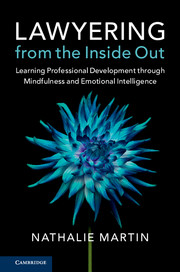 Lawyering from the Inside Out
Lawyering from the Inside Out Book contents
- Frontmatter
- Dedication
- Contents
- List of Figures
- List of Contributors
- Foreword
- Acknowledgments
- Introduction
- PART I NURTURING YOUR BEST SELF
- PART II YOU AND OTHERS AROUND YOU
- 9 Introduction to Emotional Intelligence: Theory and Practice
- 10 Advanced Emotional Intelligence Skills
- 11 Emotional Intelligence on the Page: The Writer's Life
- 12 Giving and Receiving Feedback
- 13 Empathy
- 14 Cross-Cultural Lawyering
- 15 Making Mindful, Client-Centered Decisions
- PART III YOU AND SOCIETY: FINDING GREATER PURPOSE
- Index
9 - Introduction to Emotional Intelligence: Theory and Practice
from PART II - YOU AND OTHERS AROUND YOU
Published online by Cambridge University Press: 18 May 2018
- Frontmatter
- Dedication
- Contents
- List of Figures
- List of Contributors
- Foreword
- Acknowledgments
- Introduction
- PART I NURTURING YOUR BEST SELF
- PART II YOU AND OTHERS AROUND YOU
- 9 Introduction to Emotional Intelligence: Theory and Practice
- 10 Advanced Emotional Intelligence Skills
- 11 Emotional Intelligence on the Page: The Writer's Life
- 12 Giving and Receiving Feedback
- 13 Empathy
- 14 Cross-Cultural Lawyering
- 15 Making Mindful, Client-Centered Decisions
- PART III YOU AND SOCIETY: FINDING GREATER PURPOSE
- Index
Summary
INTRODUCTION TO EMOTIONAL INTELLIGENCE
We ended Chapter 8 with a Law Pause, in which you answered this question:
Would you rather think or feel?
There is a place for each of us in the world of law, and in fact, there is more need for lawyers in the world than there are lawyers to fill that need. In Chapter 17 on professional identity, professional responsibility, and access to justice, we will talk more about this. For now, just know that there is a place for you, and not just any place, but a meaningful and important place.
We each bring something unique to the table, which is why we are all needed in our own way. I like to ask people whether they would rather think or feel because it helps me understand them better as individuals. It also helps me see what parts of lawyering each new lawyer will likely struggle with the most. We all must do both – think and feel. There will be struggle. It is just a question of what kind of struggle.
I would rather think than feel. It is a fact, and not a close call. Thinking is just easier for me, and I suspect formany lawyers and lawyers to be. When I feel, I often feel too much. I sometimes start to cry and sometimes get blue. When I think on the other hand, I wonder, I write, I read, I research, I teach, I model, I succeed. Not only do I succeed, but I feel strong. Yet all of the people closest to me are “feelers.” My husband would rather feel than think. My two closest friends at work, Fred and Jenny, would both rather feel than think. My closest non-work friends, Connie, Kim, and Pat, also all would rather feel than think. I assume these feelers are emotionally healthier than I am, but again it is not a competition. I need to be able to feel in order to do this job, and so do you.
Of course, you can't be a lawyer without being able to think, but let's face it, most of school is about teaching us to think.
Information
- Type
- Chapter
- Information
- Lawyering from the Inside OutLearning Professional Development through Mindfulness and Emotional Intelligence, pp. 119 - 137Publisher: Cambridge University PressPrint publication year: 2018